
Americans who thought the GameStop saga represented an unseemly trading frenzy haven’t seen anything yet. The coming weeks will see a flurry of old-fashioned horse trading—some would call it corruption—in Washington, as Democrats attempt to pass a partisan “stimulus” bill.
Because defections from only a handful of House Democrats or a single Senate Democrat could nix the entire $1.9 trillion spending spree, lawmakers will have great incentives to demand wasteful pork in exchange for their votes.
Bipartisan History of Sordid Bargains
The party faced a similar dilemma a dozen years ago, when it needed all 60 Senate Democrats to support Obamacare. The bill the Senate passed on Christmas Eve 2009 included all manner of sweetheart deals reflecting senators’ leverage: Sen. Ben Nelson’s, D-Neb., “Cornhusker Kickback,” which permanently exempted Nebraska from paying for Medicaid expansion; “Gator Aid,” which lessened the effects of Medicare Advantage cuts on Florida, home to Sen. Bill Nelson, D-Fla.; and the “Louisiana Purchase,” an increase in Louisiana’s federal Medicaid match made at the behest of Sen. Mary Landrieu, D-La.
After a public uproar, Congress nixed the first two earmarks. But even after their removal, Obamacare retained so many other parochial projects that the public needed a reading guide to find and understand them all. Harry Reid, D-Nev., then the Senate majority leader, not only didn’t criticize this vote-buying, he welcomed it, saying it “doesn’t speak well” of senators who didn’t trade their votes in exchange for home-state pork.

Replies